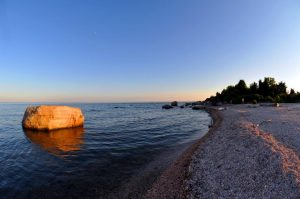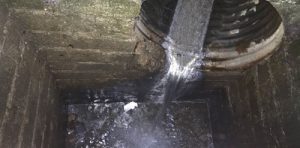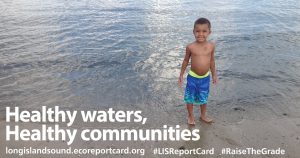 Long Island Sound is often called America’s great urban estuary.
Long Island Sound is often called America’s great urban estuary.
Roughly nine million people live on its shores and the lands that drain to it. With this concentration of people, sadly, comes pollution in many forms, from sewage to fertilizers to litter. Stemming the tide of that pollution to keep the Sound healthy and clean requires constant vigilance, and an ongoing commitment of time and money.
Save the Sound has multiple programs designed  to reduce pollution entering the Sound. Every year the Connecticut Cleanups engage thousands of community members to tackle the most visible pollution—marine debris. Every summer we train a corps of volunteers to help find and eliminate a persistent, dangerous, and largely invisible pollutant that closes beaches and shellfishing beds—fecal bacteria. And every day we are employing all the tools in our toolbox to fight enemy #1 for Long Island Sound—nitrogen pollution that causes dead zones and damages our precious coastal marshes.
to reduce pollution entering the Sound. Every year the Connecticut Cleanups engage thousands of community members to tackle the most visible pollution—marine debris. Every summer we train a corps of volunteers to help find and eliminate a persistent, dangerous, and largely invisible pollutant that closes beaches and shellfishing beds—fecal bacteria. And every day we are employing all the tools in our toolbox to fight enemy #1 for Long Island Sound—nitrogen pollution that causes dead zones and damages our precious coastal marshes.
- The Long Island Soundkeeper is on the water and in your community, searching out polluters and supporting local actions to clean up our Sound bays and harbors.
 Stormwater flushes pollutants from our streets and neighborhoods every time it rains. Find out what you can do to reduce stormwater runoff —it can be as simple and beautiful as planting a garden!
Stormwater flushes pollutants from our streets and neighborhoods every time it rains. Find out what you can do to reduce stormwater runoff —it can be as simple and beautiful as planting a garden!- Learn more about Connecticut’s Municipal Separate Storm Sewer System (MS4) Permit and the progress municipalities across the state are making to alleviate stormwater pollution.
- Community scientists are an important part of our annual water quality monitoring program which measures fecal bacteria in the Western Sound. Check out the results of this ongoing monitoring program and learn how to become a community scientist.
- Our legal team provides a critical resource in our toolbox when more forceful actions are needed to tackle pollution. Read about our current pollution-busting legal actions.
 If you like to get outside and get your hands dirty while cleaning up your community, Coastal Cleanup volunteering is for you.
If you like to get outside and get your hands dirty while cleaning up your community, Coastal Cleanup volunteering is for you.- If you see water pollution, we want to hear from you. Learn how to be a Pollution Watchdog, supporting our work to identify and eliminate pollution sources.
